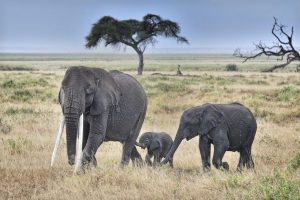South Africa has stepped up it game against wild life traffickers in the country to ensure that the crime is not only fought from within but also internationally by following the money that finances’ the menace.
South Africa and U.S. Treasury Secretary Janet Yellen recently revealed plans to form a task force that will combat the financing of wildlife trafficking.
The task force will combat illicit finance linked to illegal wildlife trade in three key areas, a statement from the U.S. Treasury Department said.
These include sharing financial red flags linked to wildlife trafficking cases, increased sharing of financial intelligence, and improving controls to combat money laundering.
Yellen made the announcement on the last leg of her Africa trip, while visiting a game reserve outside of Johannesburg.
Yellen said, “To help save wildlife populations from further poaching and disrupt the associated illicit trade, we must ‘follow the money’ in the same way we do with other serious crimes.”
Poaching of animals like rhinos is a big problem in South Africa, with some 259 rhinos killed for their horns in the first six months of last year alone.
Rhinos have been poached into near extinction. There are less than 70 Javan rhinos living in the wild today. The entire population of their Sumatran cousins hovers at about 100. Only 5,000 black rhinos–the smaller of the two African rhino species–roam the wild, most in nature reserves. This is, in part, because their horns can fetch a hefty sum of $65,000 per kilogram, making it more expensive than gold or platinum.
The illegal wildlife trade is one of the most lucrative illicit industries in the world, making an estimated $10 to $20 billion dollars annually. Rhinos are not the only animals affected. More than 60 percent of Africa’s elephant population was poached within the last 12 years.
Illegal wildlife trade has a significant impact on human health as well. The first pandemic of the 21st century–Severe Acute Respiratory Syndrome (SARS)–infected 8,000 people before it was contained. SARS’ spread began in China’s “wet” markets, where numerous wild animals are bought and sold, for use as pets, trinkets, food, or superstition. China is home to one of the most trafficked animals in the world: the pangolin.
Stopping the wild life trade especially in Africa is a collective venture, all hands must be on deck. Some of the following measures have been suggested for individuals to take to curtail the crime against wildlife and save humanity;
1. Ask before you buy
If you’re unsure where something like jewelry or clothing comes from, simply ask. Ask the vendor what it’s made of, where it’s from, and if its country of origin allows its sale.
2. Stick to certified products
Products you may not think–like furniture and paper–can also contribute to unsafe wildlife practices. Products with a Forest Stewardship Council seal ensure several things: that all trees cut down are replaced or allowed to re-grow naturally, that parts of the forest of origin are left untouched, and that the rights of indigenous people in the area are respected, and local workers are employed with a decent salary.
3. Choose sustainable, eco-friendly pets
EcoHealth Alliance provides a database of pets which are healthy for people, animals, and the environment. Many animals are taken from their natural habitats in large numbers to be sold in pet stores. This can be harmful to the animals’ wild populations, as well as having being significantly traumatic for the animal itself.
4. Eat only sustainable seafood
Overexploitation has brought many fish species to the brink of extinction. While some of these species are now protected, many are still fished and sold legally. Check the Marine Stewardship Council for sustainable seafood products.
5. Petition your local government to stop or restrict legal ivory trade
In 2016, the U.S. placed new, strict regulations on the domestic ivory trade, restricting sale of ivory across state lines and limiting ivory trophy imports to two per year, per hunter. Illegal ivory is often sold as antique, skirting these federal restrictions. California, Hawaii, Nevada, New Jersey, New York, Oregon, and Washington are the only states with ivory bans on top of federal law. Contact your local lawmakers to encourage them to put additional pressure on both legal and illegal ivory trade.
6. Pledge your support
There’s strength in numbers. Stand with organizations which urge governments to do more to stop wildlife crime in their countries.
7. Report any illegal wildlife trade
The world is much smaller thanks to the internet and now it’s easier than ever to report illegal wildlife trade when you see it. Started by the Elephant Action League, Wildleaks allows anyone to anonymously report wildlife crimes around the world.



